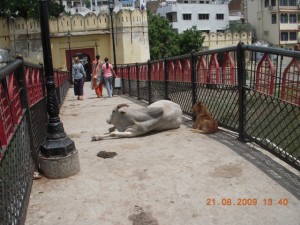
The bridge
We have begun to have serious problems with the Dell we bought in Thailand. My Asus hasn’t worked for a long time now – it crashed and never recovered – and the Dell has become the surrogate for blogging (to Andy’s mild displeasure since I tend to hog it for long periods). It seems to have developed a virus which probably infiltrated it when Andy removed the anti-virus software in an attempt to log onto the recalcitrant wireless internet in Jaisalmer. The virus has also infected my USB pen and seems to reside in my blog folder which is no longer accessible. Fortunately I had posted all the blogs stored there before it corrupted. But the upshot of the whole affair is that whilst I can still write to the pen I can’t upload to the internet for fear of infecting other computers. So I have had to resort to writing my blog ‘live’ as it were – just as well the internet is so cheap here.
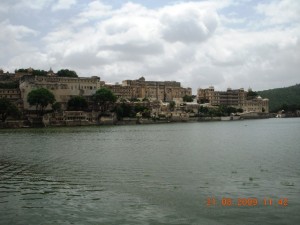
View across Lake Pichola
The views of the Lake Pichola and the Lake Palace are much better from the west side of the lake which is reached by a rather nice bridge accessed through an archway close to our guest house. Looking back over the lake reveals what makes this such a picturesque city, with its impressive architecture and the long line of ghats descending to the water. The west side has fewer and less impressive buildings, although it has its fair share of ghats which provide washing and bathing facilities for its residents. It’s quieter too, with far fewer shops and less buzz. On our return the mahout we saw a few days ago is feeding his elephant grass on the edge of the lake.
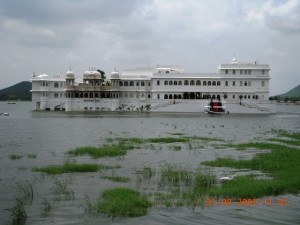
Lake Palace
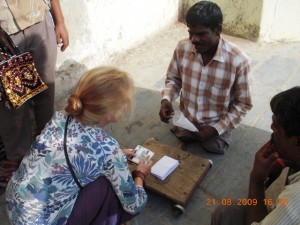
Talking to the disabled man
Crossing back over the bridge we are stopped by a disabled man. It turns out that he lost his legs in a lorry accident and there being no social welfare support in India is reduced to supporting his wife and family by begging. He wants me to write a note for him in English explaining his plight and urging people to give him money and he shares his family photos with us and a picture of himself before he lost his limbs. On reflection I’m not sure why he needed the note in English since he spoke English very well, perhaps to complement the notes he had in other languages.
In India, children frequently approach us for pens, even those dressed in school uniforms and clearly from well-to-do families who already have pens of their own. We haven’t been able to work out why pens are such a desirable commodity – possibly it is because they are not a commodity at all in India and are expensive to come by? Certainly had we known, we would have brought a stash with us.
I bought a pair of gorgeously silky harem pants the other day and can’t find a suitable kurtah to match. So I’ve ordered a tailor-made top in a burnt orange silk/cotton mix from one of the many little tailor shops that are to be found in the narrow streets. It will be ready tomorrow for a mere £2.50. But will it fit?
After a long afternoon siesta to catch up on a very poor night’s sleep we finally pay a visit to an art shop which we have passed several times and always promised the shopkeeper we would pop in to look at his hand-painted postcards. As far as we can tell, these postcards are unique to Udaipur, at least we haven’t seen them anywhere else. Old used postcards with beautifully scripted original messages and franked postage stamps are used by local artists as the backdrop to beautifully crafted miniature painting of gods such as Ganesh, Laxshmi, portraits of men in stylish turbans and musicians playing a host of traditional instruments. At 50 rupees (about 60p) they are a momento not to be missed and we select quite a collection. The shopkeeper turns out to be quite chatty – who isn’t here – and we sit and listen to his plans for developing the shop, his marketing ploys to draw in customers and his forays on the stock market. And this a man who, it transpires, cannot read and write.
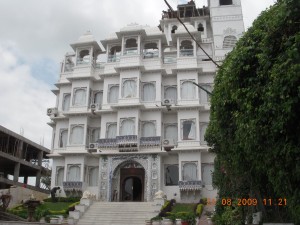
Architecture
